In 2024, it’s not just about what software developers code. It’s about one crucial aspect often overlooked beyond the lines of syntax and new frameworks. We’re talking about soft skills – how programmers can collaborate, communicate, and adapt in a company.
So, why should developers prioritize mastering soft skills? We believe that soft skills can make IT specialists more effective collaborators and problem solvers, ultimately serving as a game-changer capable of elevating a developer’s career.
Check out our article for the 6 important soft skills developers need in 2024 to shape success!
Table of Contents
- What are Soft Skills?
- Effective Communication
- Teamwork
- Adaptability
- Critical Thinking and Problem-Solving
- Time Management
- Emotional Intelligence
- Wrapping Up
What are Soft Skills?
Soft skills refer to a set of interpersonal, communication, and personal attributes that complement technical or hard skills.
Unlike technical skills, which are specific to a particular job or industry, soft skills are more universal and can be applied across various roles and industries.
Soft skills are essential for effective collaboration, communication, and overall success in the workplace, enhancing an individual’s ability to work well with others and navigate professional challenges.
Let’s dive in.
Effective Communication

In a world where remote work is becoming increasingly prevalent, developers need to master the art of communication. This includes not only expressing technical concepts clearly but also actively listening to understand the needs of stakeholders.
Clear and concise communication can bridge the gap between developers, project managers, and clients, ensuring everyone is on the same page.
4 tips how to communicate clearly:
- Clarity: Express ideas in a straightforward manner, avoiding unnecessary jargon. Clear and concise communication minimizes the risk of misunderstandings.
- Active listening: Communication is a two-way street. Actively listen to colleagues and clients, ensuring that you understand their perspectives before responding.
- Choose the right medium: Different situations call for different communication tools. Whether it’s an email, a video call, or a face-to-face meeting, choose the medium that best suits the context.
- Feedback receptivity: Be open to feedback and encourage a culture where team members feel comfortable providing input.
Teamwork

No software project is a solo endeavor. Collaborative development is crucial for success. Developers must be able at working in cross-functional teams, contributing ideas, and integrating feedback. At the core of effective teamwork are two principles that often make all the difference: respecting your team members and their ideas, and making sure everyone’s time is valued.
Imagine a team where every idea is heard and respected, regardless of whether everyone agrees. It’s in this space of diverse perspectives that true innovation thrives. Each team member brings a unique set of experiences and insights to the table, and respecting these differences creates an environment where everyone feels empowered to contribute their best.
In its turn, time is a precious commodity, especially in the software development realm. Valuing your teammates’ time is more than just being punctual for meetings. It’s about creating a culture of reliability and accountability.
A team where everyone keeps to meeting times, submits updates as promised, and communicates beforehand if a deadline can’t be met or a meeting needs to be skipped operates smoothly, efficiently, and with a shared understanding that everyone’s time is important.
Adaptability

For developers, adaptability means the ability to navigate and embrace change, whether it be in programming languages, frameworks, or methodologies. It’s about staying agile in the face of evolving tech landscapes and being open to continuous learning.
Developers who can swiftly adapt to rapid technological changes are better equipped to stay relevant and contribute effectively.
Moreover, projects can take unexpected turns. An adaptable developer can pivot quickly, adjusting strategies and approaches to meet evolving project requirements without compromising quality.
Adaptability tips for developers:
- Continuous learning: Stay updated on new technologies, trends, and best practices. Platforms like online courses, webinars, and tech forums can be valuable resources.
- Flexibility in coding practices: Be open to experimenting with different coding practices and methodologies.
- Agile methodologies: Familiarize yourself with agile methodologies, which emphasize adaptability, collaboration, and responding to change over rigid planning.
- Networking and community engagement: Attend meetups, participate in forums, and engage in discussions to learn from the experiences of others.
- Feedback acceptance: A willingness to receive constructive criticism and make improvements reflects an adaptive mindset.
- Problem-solving agility: Consider various solutions and be willing to adjust your approach based on the specific challenges at hand.
Critical Thinking and Problem-Solving

Picture this – a developer diving into a complex coding challenge, not just to write lines of code but to dissect, question, and understand the very essence of the problem. That’s critical thinking in action. It’s an ability to evaluate information objectively and make decisions rooted in reason.
Why does it matter? Because in the complicated process of code, understanding the “why” behind every line can make all the difference. Critical thinking is about crafting elegant solutions, choosing the right technologies and making decisions.
Now, imagine a developer faced with a seemingly insurmountable challenge. Here’s where problem-solving swoops in. It’s the ability to navigate through coding puzzles with creativity, to innovate in the face of complexity, and to engineer solutions that transcend the ordinary.
But here’s the magic – critical thinking and problem-solving are partner skills. Critical thinking sets the stage, providing a deep understanding of the problem. Problem-solving takes the lead, applying that understanding in creative and effective ways.
Software engineers armed with critical thinking and problem-solving soft skills navigate challenges with agility and turning every coding step into a functional process.
Time Management

In the world of coding, time is a precious currency. Developers are often engaged in time-bound projects, and with the rise of remote work, effective time management has become more crucial than ever.
In the current landscape, where remote work is prevalent, time management is a lifeline. Developers need to navigate their tasks efficiently, meet deadlines, and ensure project completion without unwelcome surprises.
Clients look for dedicated teams who deliver quality work within set deadlines, so effective time management is a testament to a developer’s commitment and professionalism. When deadlines are consistently met, it builds trust and establishes a reputation for reliability.
You may also be interested in: Time Management Techniques for Small Business Owners
On the flip side, when a developer struggles to complete a project on time, it signals a deficiency in time-management skills. In a field where punctuality is paramount, this can reflect negatively on the individual and the team. Clients seek assurance that their projects are in capable hands, and meeting deadlines is a key indicator of that capability.
Here are some tips for effective time management for developers:
- Prioritize tasks: Start with the most challenging and urgent tasks. Tackling them first sets a positive tone for the rest of the day.
- Take strategic breaks: A healthy break can rejuvenate the mind. A short walk outdoors or a change of scenery can boost productivity.
- Set timers: Break down tasks into smaller segments and set timers. This helps maintain focus and ensures that smaller tasks are completed promptly.
Emotional Intelligence

According to a survey conducted by Harvard Business Review, 90% of top performers in the workplace possess high emotional intelligence. Additionally, a study by TalentSmart found that people with high emotional intelligence make, on average, $29,000 more per year than their counterparts with lower emotional intelligence.
Technical skills alone are not enough. Emotional intelligence (EI) is a valuable skill that sets outstanding developers apart. It involves understanding and managing one’s emotions and those of others, fostering effective communication, and navigating interpersonal relationships with empathy and tact.
What emotional intelligence can achieve:
- Enhanced collaboration: Developers with high emotional intelligence collaborate more effectively with team members.
- Effective communication: EI enables developers to communicate complex ideas with clarity and empathy, reducing misunderstandings.
- Conflict resolution: Emotionally intelligent developers can navigate conflicts gracefully, finding solutions that benefit everyone involved.
- Adaptability: Developers with strong emotional intelligence adapt to changes more easily.
The statistics show the impact of emotional intelligence on individual and team success. When hiring developers, recognizing and valuing emotional intelligence as a soft skill ensures that you’re building a technically proficient team.
Wrapping Up
The ability to communicate effectively, collaborate seamlessly, adapt to change, think critically, empathize with users, and manage time efficiently will set developers apart in 2024 and beyond.
By cultivating these soft skills, developers can contribute not only to the success of their projects but also to the overall growth and innovation of the tech industry.






